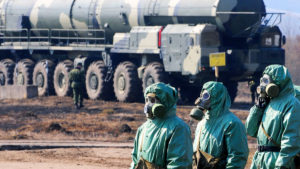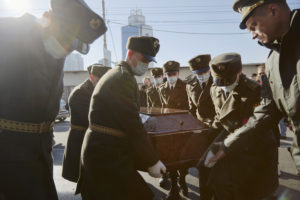“How could our government have been so stupid?” one Russian acquaintance of mine wondered, after the West imposed sweeping sanctions that froze around $300 billion of the Russian government’s foreign exchange reserves held in Western banks.
Over the past few weeks, the US, EU, UK, Japan, and other allies have hit Russia with a package of restrictions targeting its access to foreign financing and technology. Russia’s currency has plummeted, inflation is rising, living standards are slumping, and many factories across the country have stopped work due to shortages in components. Russia now faces the deepest economic crisis since post-Soviet collapse in the Nineties — a downturn so severe that it may eventually threaten Vladimir Putin’s hold on power.
Only one month ago, analysts were focused not on Russia’s vulnerability to sanctions but its supposed “sanctions-proofing” strength. The Russian government has dealt with Western sanctions for decades, from the technological restrictions the West imposed on the USSR to the most recent restrictions on oil drilling technology and access to capital markets imposed after Russia’s first attack on Ukraine in 2014. However, the strength of the latest came as a surprise to Russia’s leaders. They thought they had taken adequate steps to defend their economy and that Western leaders would be too worried about domestic prosperity to risk tough measures. Neither assumption proved correct — and now Russia is paying the price.
Like many adversaries of the United States, from North Korea to Iran to Venezuela, Russia sees American sanctions as a fact of life. Almost every year over the past decade, the US has slapped on a new set of sanctions, sometimes unilaterally, sometimes in conjunction with allies in Europe. Some have been linked to domestic human rights violations, such as those implemented under the Magnitsky Act, named after a Russian lawyer who died under suspicious conditions in jail after uncovering a government-linked fraud. Some have been sparked by Russian meddling in American elections. Others were motivated by Russia’s use of a nerve agent in an attempted assassination in the UK. As Putin said just before announcing his decision to attack Ukraine: “They will never think twice before coming up with or just fabricating a pretext for yet another sanction attack … their one and only goal is to hold back the development of Russia.”
From the moment Putin announced that Russia was beginning a “special military operation” to “denazify” Ukraine, more sanctions were inevitable. The Biden administration had threatened “devastating” sanctions, though after endured many rounds of not-very-tough Western sanctions, most Russian leaders thought America was bluffing. The fact that European leaders were divided about sanctions — and that Germany, Europe’s most important player, was putting the finishing touches on a new Russian gas pipeline — led the Russians to believe that the West wasn’t ready for full-scale economic warfare. The Kremlin, therefore, began the war expecting measures that were costly but survivable. In a public meeting right before the invasion, Prime Minister Mikhail Mishustin briefed Putin that “we have thoroughly reviewed these risks” and that “we have been preparing for months”.
In fact, Russia had been preparing for years, knowing that sanctions were always a risk. America’s sanctions campaign against Iran, which cut off its ability to export oil, was a worrisome precedent — though Russia was a far more important oil producer than the Islamic Republic. The 2014 sanctions against Russia, meanwhile, showed that when the US, UK, and EU joined forces, they could sever Russian firms from financial markets in ways that no other country — not even China — could equal.
In response, Russia developed a five-pronged strategy to steel its economy. The first step was to build up a substantial war chest of foreign exchange reserves, including major currencies (Euro, sterling, dollar, yen, and renminbi) and over $100 billion worth of gold. These reserves, equivalent to over twice the value of goods Russia imports in a typical year, were supposed to give Russia financial flexibility in case the West tried imposing restrictions on its ability to export goods and earn foreign currency abroad.
The second prong in Russia’s “sanctions-proofing” strategy was to reduce its use of the US dollar, the currency in which most commodities — and thus most of Russia’s exports — are priced. Russia managed to substantially reduce the scope of dollars in its foreign trade, largely by shifting its trade with China to Euros. The Kremlin also cut dollar holdings in its foreign currency reserves, choosing to hold more of other currencies, including renminbi, instead.
Third, Russia tried developing internal payments systems in case it was severed from Western-dominated platforms. Many purchases in Russia are made using Visa or Mastercard, which are subject to US sanctions legislation. Most international banking transactions are mediated by SWIFT, a Belgium-based organisation subject to EU sanctions. Russia has rolled out a domestic card payment system, called Mir, and an interbank payment system modeled on SWIFT, trying to prepare itself for a potential future without access to these Western platforms.
The fourth strategy was to intensify economic cooperation with China. The more China’s economy grew, and the more ties that Russia had with it, the more Russian leaders felt secure. The Kremlin knew it could rely on China to vociferously object to any Western sanctions that were applied extraterritorially to Chinese firms.
Finally, Russia counted on the West’s energy dependence to limit any willingness to apply economic pressure. The fact that the Germans were afraid of even mentioning the Nord Stream II pipeline demonstrated timidity that emboldened the Kremlin. However, though Germans were uniquely supine in their energy relations with Russia, they weren’t alone in their dependence. America liked to condemn Germany over Nord Stream II, but American politicians were and are highly sensitive to gasoline prices. Restrictions on Russian oil exports were, therefore, guaranteed to be a matter of acute domestic political concern, because such a move would drive up gasoline prices worldwide. The Kremlin assumed this was a price Western leaders would be unwilling to pay.
When Russian forces rolled into Ukraine, however, the West was jolted out of complacency. Though US and UK intelligence had been warning for several months that Russia was ready to invade, most people — and most Western European leaders — simply didn’t believe it. Images of Ukrainian cities aflame left them shocked. So it was Europe that led the drive during the first week of war for tougher economic sanctions, culminating in an almost unprecedented freeze on Russia’s central bank reserves.
This was a level of sanctions escalation that Russian policymakers had never seriously contemplated. On its own, the move — grabbing control of around $300 billion worth of Russian foreign exchange reserves stashed in Western financial institutions — constituted the biggest bank heist in world history. The fact that these moves were multilateral meant that “de-dollarising” didn’t matter. The Euro, pound, and yen were no more accessible to the Kremlin. And it didn’t matter what payments system was used, Russian or otherwise, if a substantial chunk of the world economy simply refused to transact with you.
The Chinese — supposed allies in “sanctions-proofing” — were no less shocked than the Russians by this display of financial firepower. China has already announced that it is cutting off certain Russian industries under special sanctions, such as aviation. China’s banks, meanwhile, continue to undertake some non-sanctioned transactions with Russia, but according to reports they are broadly following the West’s lead. The Moscow–Beijing entente is more a marriage of convenience than a sanctions-busting partnership.
The only part of Russia’s sanctions-proofing plan that is proving somewhat effective is the bet that Western leaders can’t stomach a full energy cut off. The US and UK have announced bans on importing Russian energy, but this only has a minor impact. The EU has announced plans to cut Russian energy imports to zero — but only after several years. The move that would really hit Russia would be to block all its energy exports, via an Iran-style regime that severed its ability to sell to third parties such as India and China. This would dramatically escalate pressure on Russia. It would also push oil prices far higher.
For now, therefore, energy remains the one major loophole in the sanctions regime. Nevertheless, the Russian state faces a deep economic crisis. The ruble has slumped and prices are rising. Unemployment is set to spike as factory closures cause industrial bankruptcies. Living standards will fall far behind inflation, which will accelerate over the coming months. Foreign companies of all types, from BP to McDonald’s, are fleeing.
“I understand that rising prices are seriously hitting people’s incomes,” Putin admitted in a speech on Wednesday. What he didn’t say is that he has neither a plan, nor any resources, to deal with this. On the battlefields of Ukraine, Russian forces have demonstrated incompetent organisation and a horrible command of logistics. Despite much talk of “sanctions-proofing”, the Kremlin’s efforts to protect itself from economic warfare have been just as inept — and, for Russia, disastrous.
Disclaimer
Some of the posts we share are controversial and we do not necessarily agree with them in the whole extend. Sometimes we agree with the content or part of it but we do not agree with the narration or language. Nevertheless we find them somehow interesting, valuable and/or informative or we share them, because we strongly believe in freedom of speech, free press and journalism. We strongly encourage you to have a critical approach to all the content, do your own research and analysis to build your own opinion.
We would be glad to have your feedback.
Source: UnHerd Read the original article here: https://unherd.com




